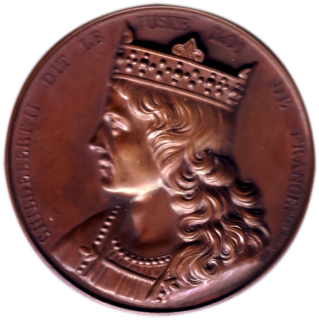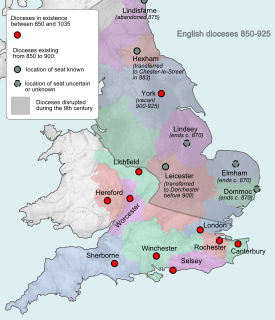This page is based on this
Wikipedia article Text is available under the
CC BY-SA 4.0 license; additional terms may apply.
Images, videos and audio are available under their respective licenses.

Year 592 (DXCII) was a leap year starting on Tuesday of the Julian calendar. The denomination 592 for this year has been used since the early medieval period, when the Anno Domini calendar era became the prevalent method in Europe for naming years.

Dorchester on Thames is a village and civil parish in Oxfordshire, about 3 miles (5 km) northwest of Wallingford and 8 miles (13 km) southeast of Oxford. The town is a few hundred yards from confluence of the River Thames and River Thame.

Cynegils [kyneɣɪls] was King of Wessex from c. 611 to c. 642. Cynegils is traditionally considered to have been King of Wessex, but the familiar kingdoms of the so-called Heptarchy had not yet formed from the patchwork of smaller kingdoms in his lifetime. The later kingdom of Wessex was centred on the counties of Hampshire, Dorset, Somerset, and Wiltshire, but the evidence of the Anglo-Saxon Chronicle is that the kingdom of Cynegils was located on the upper River Thames, extending into northern Wiltshire and Somerset, southern Gloucestershire and Oxfordshire, and western Berkshire, with Dorchester-on-Thames as one of the major royal sites. This region, probably connected to the early tribal grouping known as the Gewisse, a term used by Bede for the West Saxons, lay on the frontier between the later kingdoms of Wessex and Mercia.

The Bishop of Norwich is the ordinary of the Church of England Diocese of Norwich in the Province of Canterbury. The diocese covers most of the county of Norfolk and part of Suffolk. The current Bishop of Norwich is Graham James, who signs as +Graham Norvic.
Æscwine was a King of Wessex from about 674 to 676, but was probably not the only king in Wessex at the time.
Ceol was King of Wessex from 592 to 597.
Æthelwold was a common Anglo Saxon name. It may refer to:

Timothy John Stevens, is a retired British Anglican bishop. He was Bishop of Dunwich from 1995 to 1999 and was Bishop of Leicester from 1999 to 2015. From 2003 to 2015, he was a member of the House of Lords as a Lord Spiritual and served as Convenor of the Lords Spiritual from 2009 to 2015.

Dommoc, a place not certainly identified but probably within the modern county of Suffolk, was the original seat of the Anglo-Saxon bishops of the Kingdom of East Anglia. It was established by Sigeberht of East Anglia for Saint Felix in c. 629–31. It remained the bishopric of all East Anglia until c. 673, when Theodore of Tarsus, Archbishop of Canterbury, divided the see and created a second bishopric at either North Elmham, Norfolk, or South Elmham, Suffolk. The see of Dommoc continued to exist until the time of the Viking Wars of the 860s, after which it lapsed.
Cuthwulf, also sometimes Cutha, was the third son of Cuthwine, and consequently a member of the House of Wessex. Although a member of the direct male line from Cynric to Egbert, Cuthwulf was never king. He is said to have been born circa 592, and his death date is unknown.
Cedda was the second son of Cuthwine and consequently a member of the Wessex family. He was born c. 590 and his death date is unknown. He had one recorded son, Coenberht, the father of King Caedwalla of Wessex.
Cenberht was a king in the lands of the West Saxons.
Frithugyth was the wife of King Æthelheard of Wessex.
The Bishop of Dunwich is an episcopal title which was first used by an Anglo-Saxons bishop between the 7th and 9th centuries and is currently used by the suffragan bishop of the Diocese of St Edmundsbury and Ipswich. The title takes its name after Dunwich in the English county of Suffolk, which has now largely been lost to the sea.
Eric Nash Devenport was Bishop of Dunwich from 1980 to 1992.
Michael Robert "Mike" Harrison is a Church of England bishop. Since February 2016, he has been the Bishop of Dunwich, a suffragan bishop in the Diocese of St Edmundsbury and Ipswich. He was consecrated a bishop on 24 February 2016. From 2006 to 2016, he was the Director of Mission and Ministry in the Diocese of Leicester.

The Bishop of Dunwich is an episcopal title which was first used by an Anglo-Saxon bishop between the seventh and ninth centuries and is currently used by the suffragan bishop of the Diocese of St Edmundsbury and Ipswich. The title takes its name after Dunwich in the English county of Suffolk, which has now largely been lost to the sea.





